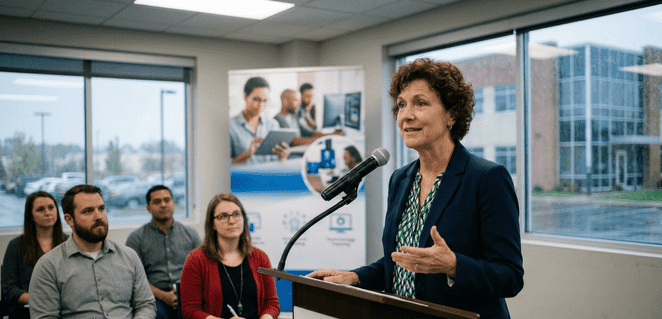Lessons from Laos’ Leap into Tech-Enabled Law
The country of Laos is stepping forward in an impressive way by using AI in legal systems in Laos to modernize how law works and how justice is delivered. A recent event in the capital, Vientiane, brought together law firms, universities and tech people to promote the use of artificial intelligence in legal practice and legal education in Laos. The focus included things like using AI for foreign-related legal services, contract generation and compliance review.
This news shows how legal digital transformation in Asia is spreading, even in markets you may not have heard much about.
Why Should You Be Concerned?
When a country uses tech to support law, it gains many benefits. In Laos’s case, we see the rise of tech-enabled law benefits such as faster legal services, support for complex international cases, and better education for new lawyers. Using technology in justice systems helps make things clearer, faster and fairer.
Yet, those benefits don’t come only by adopting tools. They come when people, laws and institutions change together. For example, a report showed that Laos still lags behind its neighbours in the digital economy and needs stronger legal, institutional and cultural changes to catch up.
The move by Laos signals to other legal tech emerging markets: you can leap ahead if you align tech + law + skills.
Suggested read: For anyone curious about how AI is reshaping lawyers’ careers, check out The Legal Industry Is Changing Fast: Why AI Legal Certification Is a Must-Have.
What Laos is Doing
Here are three key steps that Laos is taking:
- Education and professional training: The law school at the National University of Laos is working with Chinese partners to train legal professionals with tech skills and international outlooks.
- Applying AI in legal services: A law firm in Laos is using AI for things like contract generation, compliance checks and international arbitration services. This means legal work can be more high-value and less routine.
- Digital infrastructure and governance support: More broadly in Laos, work is ongoing to improve governance through digital transformation. The Ministry of Technology and Communications of Laos has launched many digital government systems already.
These moves highlight how technology and justice can work together: better tools + better law + better people = better outcomes.
Suggested read: If you’d like to explore how AI ensures legal compliance in workplaces, see AI Legal Compliance in the Workplace: Understanding the Regulatory Framework.
Key Lessons for Organisations & Professionals
From Laos’s leap, here are major takeaways:
- Link technology with law education: If you build AI tools but no one knows how to use them or understand them in a law context, you’ll struggle. Laos is training future lawyers with AI skills.
- Start with specific use cases: instead of trying to automate everything at once, focus on areas where AI can help legal services (contracts, compliance, foreign law). Laos picked these.
- Align institution, law, and tech: The rule of law, legal institutions, and technology must move together. Laos’s digital economy report shows that if one is weak (say law or infrastructure), the benefit is reduced.
- Prepare for change in roles: when AI enters law, the roles of legal professionals shift. They may do less routine work and more advisory or strategic work.
- Focus on fairness & justice: Using AI in legal systems Laos is not just about speed or cost. It’s about fairness and transparency too. Technology supports justice and helps people trust the system.
Suggested read: To understand how AI tools are selected by legal pros, see Top AI Tools for Legal Professionals: Boost Legal Efficiency.
The Big Picture: Why It’s Useful Beyond Laos
Even though Laos is a small country, what it is doing carries global relevance. For regions across Asia and beyond where legal frameworks are still evolving, there’s an opportunity to skip older methods and move into tech-enabled law.
When legal systems use AI, we get:
- Shorter legal processing times
- Better compliance tracking
- Access to justice for more people
- Legal services in emerging markets more competitive
These are tech-enabled law benefits that other developing countries can aim for.
Also, in Asia the legal industry is shifting fast. One report shows that although the technology is important, people skills still matter more for success.
Suggested read: For more on why AI in legal systems matters, see How AI Is Transforming Legal Practices: AI For Law.
Final Thoughts
The journey of Laos into tech-enabled law shows that when a country combines law, educational upgrades and digital tools, the outcome can be powerful. For organisations and professionals who want to be part of this shift, whether law firms in Asia, corporations in emerging markets or individual lawyers wanting to upskill, the moment is now.
If you are looking to gain credentials and confidence in this domain, consider pursuing an AI Legal certification from AI CERTs. This can equip you to lead in legal digital transformation in Asia, navigate AI in legal systems in Laos or anywhere else, and harness legal tech in emerging markets with skill and integrity.
Take the step toward mastering technology and justice together today.
Recent Blogs

FEATURED
New Research on Occupational AI Training Models — Are Companies Training the Wrong AI Roles?
February 27, 2026
FEATURED
Fortune Reports AI Market Shakeups — Are Companies Accelerating Employee AI Training to Stay Competitive?
February 27, 2026
FEATURED
Walmart Leadership Says Workforce Upskilling Is Critical — What This Means for AI Training Programs
February 27, 2026
FEATURED
Massachusetts Just Made AI Training Free — Will Enterprise Partnerships Become the New Workforce Strategy?
February 27, 2026
FEATURED
Are Training Partnerships Replacing Traditional L&D?
February 27, 2026

